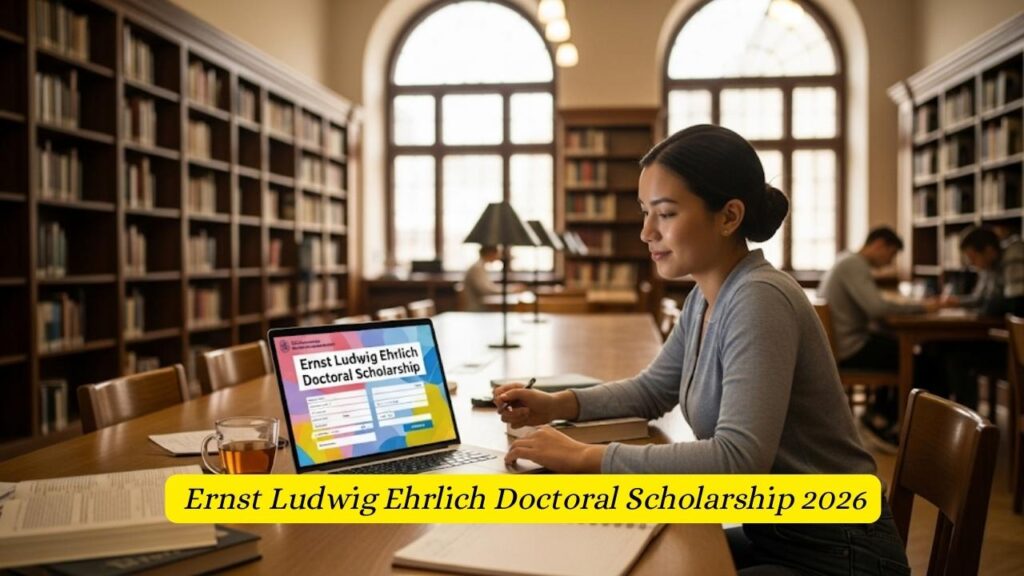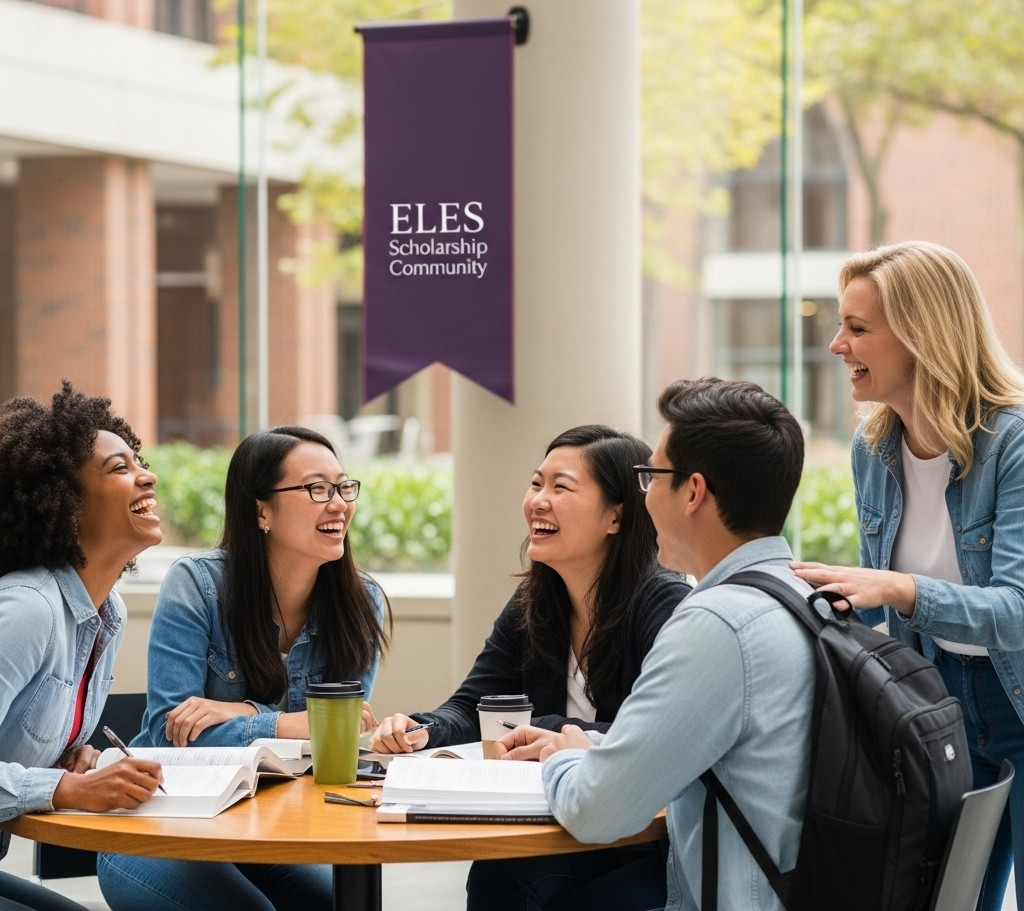Embarking on a doctoral journey is a monumental step, but navigating the financial landscape of a PhD can feel like a labyrinth. This is where prestigious, fully-funded opportunities like the Ernst Ludwig Ehrlich Doctoral Scholarship 2026 become not just a possibility, but a true game-changer. This guide is designed to empower you with comprehensive, actionable, and encouraging information, transforming a daunting application into a structured, achievable goal. I’ve seen many brilliant minds succeed by focusing on the details, and this scholarship, with its unique blend of academic and community-focused support, is one of the most rewarding.

What is the Ernst Ludwig Ehrlich Studienwerk (ELES)?
The Ernst Ludwig Ehrlich Studienwerk (ELES) is one of Germany’s thirteen foundations for the promotion of young talent, officially supported by the German Federal Ministry of Education and Research (BMBF). Its core mission is to promote talented Jewish students and doctoral candidates who are not only academically gifted but also deeply engaged in their communities. ELES stands for a pluralistic, liberal, and confident Judaism, fostering a new generation of academics who are prepared to take on responsibility in society.
Ernst Ludwig Ehrlich Doctoral Scholarship 2026
| Key Fact | Detail |
| Who Can Apply? | Jewish students and doctoral candidates of all disciplines (except medicine). Non-Jewish PhD students with a project on a Jewish topic are also eligible. DAAD Scholarship Database |
| What is Funded? | A monthly stipend, a research allowance, and comprehensive non-material support. |
| Duration | A standard funding period of two to three years, with potential for extension. Grantway |
The Ernst Ludwig Ehrlich Doctoral Scholarship is more than just a financial grant; it’s an invitation to join a community dedicated to academic excellence and social responsibility. By understanding the requirements, preparing a thoughtful application, and demonstrating your commitment to both your research and your community, you can position yourself as a strong candidate. The path to a funded PhD is challenging, but with careful preparation and a genuine passion for your work, you can successfully navigate the Ernst Ludwig Ehrlich Doctoral Scholarship 2026 application process and secure the support you need to achieve your academic dreams. Start today—your future is waiting.
Understanding the ELES Doctoral Scholarship Requirements
The application for a scholarship of this caliber is holistic. ELES looks for candidates who are not just excellent in their academic field, but who also embody the values of the foundation. Here’s a breakdown of the key requirements:
1. Academic Excellence: A strong academic record is the foundation of any application. You must demonstrate exceptional scientific quality and an innovative doctoral project. While you don’t need to be at the very top of your class, your grades and research plan should speak for themselves. The scholarship is intended for those in the initial phase of their dissertation, so your project proposal is a critical component.
2. Social and Community Engagement: This is a key differentiator of the ELES scholarship. Applicants are expected to be actively involved in the Jewish community, social work, youth programs, or student organizations. This isn’t a box to check; it’s an opportunity to show your passion and commitment to making a difference. Think about how your experiences, from volunteering at a local community center to organizing events for a student group, demonstrate your leadership and social responsibility.7
3. Language Proficiency: A solid grasp of the German language is a formal requirement, with a minimum B2 level. While the application can be in English, the interview will likely be conducted in German. This is crucial for participating in the intellectual and community-building aspects of the scholarship program. Don’t let this be a last-minute hurdle; start strengthening your German language skills early.
4. Citizenship and Residency: The scholarship primarily targets Jewish doctoral candidates who are citizens of Germany or an EU member state, or those with educational residency status as per BAföG §8. In justified cases, however, non-EU citizens can be considered, especially if their project has a focus on a Jewish subject. It’s always best to check the official guidelines for the most current information on eligibility.

The ELES Application Process: A Step-by-Step Approach
Applying for a scholarship can feel overwhelming, but breaking it down into manageable steps makes all the difference. In my experience advising students, one common hurdle is underestimating the time and thought required for each component.
1. Prepare Your Documents: Start by gathering all the necessary papers. This includes your CV, proof of university acceptance, academic transcripts, and a detailed dissertation project plan. Ensure your CV follows a standard format like Europass.
2. Craft Your Motivation Letter: This is your chance to tell your story. Your motivation letter should be more than a list of achievements; it should be a compelling narrative that connects your academic aspirations with your community engagement and personal values. Explain why you are a good fit for ELES and how you will contribute to the foundation’s mission.
3. Secure Letters of Recommendation: ELES requires two academic letters of recommendation and one non-academic letter.10 The academic letters should come from professors who know you and your research well. The non-academic letter should be from someone who can speak to your community involvement, such as a rabbi, a leader of a Jewish organization, or a supervisor from a volunteer position. Remember, these need to be sent directly from the referees, so give them plenty of time.11
4. The Online Application Portal: All applications are submitted through the ELES online portal.12 It’s a straightforward process, but it’s essential to fill out every section accurately. Don’t rush this step. Once you’ve submitted your application, the foundation will review your materials and, if you’re a strong candidate, invite you for an interview.
The Value of the ELES Scholarship: More Than Just Money
The financial support provided by ELES is substantial, including a monthly stipend and a research allowance. This financial security allows you to focus fully on your research without the pressure of having to find additional employment. However, the true value of this scholarship extends far beyond the monetary.
The non-material support is a cornerstone of the ELES program. You will be paired with two instructors who provide individual mentoring and guidance. ELES also organizes biannual seminars, where you can present your work, exchange ideas with other scholars, and build a strong network. This creates a supportive, intellectual community that nurtures both your academic and personal growth. As a scholar, you’ll join a vibrant network of Jewish intellectuals and future leaders.
The Final Push: Submitting a Winning Application
Deadlines for the Ernst Ludwig Ehrlich Doctoral Scholarship are a key consideration, with two application periods annually:
- March 31: for admission on October 1st of the same year.
- September 30: for admission to the program starting April 1st of the following year.
The application period for the Ernst Ludwig Ehrlich Doctoral Scholarship 2026 is now open, with the September 30 deadline for spring 2026 admission. It’s critical to plan your application well in advance of these dates to ensure you have time to gather all required materials and secure your letters of recommendation.

Remember, your application should be a reflection of who you are—a diligent academic and a committed community member. I’ve seen many candidates get bogged down in the technicalities and forget to show their passion. This is your opportunity to demonstrate how your research, your values, and your commitment to the Jewish community are perfectly aligned with the mission of ELES.
Your Future in Physics: A Complete Guide to the CERN PhD Student Scholarship 2025
Your Ultimate Guide to the Chungbuk National University G-Cruit Scholarship for Fall 2025
FAQ
Q1: Can I apply if I have already started my PhD?
A: The scholarship is intended for those in the initial phase of their doctoral project, typically no more than one year since the start of the dissertation project.23
Q2: Are there any age limits for applicants?
A: There is no maximum age limit for this scholarship, making it accessible to a wide range of candidates.
Q3: Do I need to be a German citizen to apply?
A: While the scholarship primarily supports German and EU citizens, non-EU citizens with a research project on a Jewish subject are also encouraged to apply.










